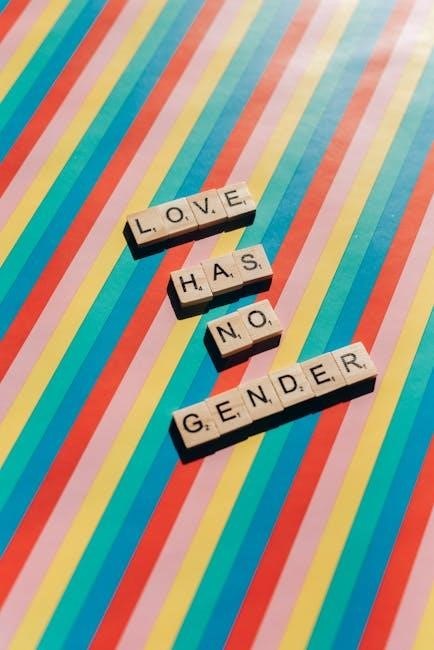
A Personal Bill of Rights is a set of assertions ensuring individual autonomy, dignity, and emotional well-being, inspired by the US Bill of Rights and similar historical documents.
1.1 Definition and Purpose
A Personal Bill of Rights is a documented set of individual assertions that define and protect one’s fundamental freedoms and boundaries. It serves as a guide to ensure self-respect, emotional well-being, and healthy relationships. Unlike the US Bill of Rights, which applies universally, a personal bill is tailored to an individual’s unique needs and values. Its primary purpose is to empower individuals to assert their rights confidently, fostering autonomy and dignity. By outlining specific entitlements, such as the right to express emotions or set boundaries, it provides a framework for personal empowerment. This document acts as a daily reminder of one’s entitlements, helping to maintain mental and emotional balance in all aspects of life. It is a powerful tool for self-care and personal growth.
1.2 Historical Context and Inspiration
The concept of a Personal Bill of Rights draws inspiration from historical documents like the US Bill of Rights, adopted in 1791, which guarantees freedoms such as speech, religion, and the right to a fair trial. Similarly, the idea of personal rights has evolved over time, influenced by movements advocating for individual autonomy and self-expression. The personal bill of rights emerges as a modern tool, allowing individuals to define their own boundaries and entitlements, much like how historical charters protected collective liberties. This approach reflects a growing emphasis on personal empowerment and self-care, encouraging individuals to assert their needs confidently. By mirroring the structure of foundational rights documents, the personal bill of rights provides a framework for individuals to claim their freedoms in everyday life, fostering dignity and emotional well-being. This historical evolution underscores the timeless importance of protecting individual rights.
1.3 Importance in Modern Life
In today’s fast-paced and often demanding world, a Personal Bill of Rights serves as a vital tool for maintaining emotional well-being and personal boundaries. It empowers individuals to assert their needs confidently, fostering self-respect and mental clarity. By clearly defining one’s rights, such as the freedom to express emotions or say no without guilt, individuals can navigate relationships and societal pressures more effectively. This practice aligns with modern movements emphasizing self-care and mental health, offering a proactive approach to safeguarding one’s autonomy. Ultimately, a Personal Bill of Rights helps create a balanced and fulfilling life by establishing a clear framework for how one expects to be treated and how they will treat others.

Key Principles of a Personal Bill of Rights
A Personal Bill of Rights is founded on principles of respect, self-determination, and emotional well-being, ensuring individuals can assert their needs and boundaries with clarity and confidence.
2.1 The Right to Autonomy and Self-Determination
The right to autonomy and self-determination is a cornerstone of a Personal Bill of Rights. It emphasizes the freedom to make decisions that align with one’s values, goals, and aspirations. This principle ensures individuals can govern their own lives, free from undue influence or control by others. Autonomy extends to setting personal boundaries, pursuing choices that foster growth, and taking responsibility for one’s actions. By asserting this right, individuals affirm their dignity and capacity to shape their own destiny. This principle is essential for fostering self-respect, confidence, and a sense of empowerment, allowing people to live authentically and fulfill their potential without compromising their integrity or autonomy.
2.2 The Right to Set Boundaries
The right to set boundaries is a fundamental aspect of a Personal Bill of Rights, ensuring individuals can protect their physical, emotional, and mental well-being. Boundaries define limits that others must respect, allowing individuals to maintain their personal space and energy. This right acknowledges that saying “no” to requests or demands that feel unreasonable or unsustainable is not only valid but necessary. By setting clear boundaries, individuals can prevent emotional exhaustion, reduce conflict, and foster healthier relationships. This principle also emphasizes the importance of prioritizing one’s own needs and desires, ensuring that personal limits are honored and respected by others. Asserting this right promotes self-respect, balance, and the ability to nurture meaningful connections without compromising one’s own well-being.
2.3 The Right to Express Emotions and Opinions
The right to express emotions and opinions is a cornerstone of personal empowerment, ensuring individuals can freely communicate their feelings and perspectives. This principle, rooted in the broader concept of freedom of expression, acknowledges that every person has the liberty to voice their thoughts without fear of judgment or retaliation. Expressing emotions openly fosters authenticity, strengthens relationships, and promotes emotional well-being. It also allows individuals to assert their needs and stand up for themselves in a healthy, constructive manner. However, this right comes with the responsibility to respect others’ feelings and opinions, ensuring communication remains respectful and considerate. By honoring this right, individuals can cultivate honesty, integrity, and self-awareness, which are essential for personal growth and fulfilling connections with others.

How to Create Your Personal Bill of Rights
Creating a Personal Bill of Rights involves identifying core values, brainstorming specific rights, and finalizing a document that reflects your autonomy, boundaries, and emotional well-being.
3.1 Identifying Core Values and Beliefs
Identifying core values and beliefs is the foundation of creating a Personal Bill of Rights. Start by reflecting on principles that guide your actions and decisions, such as respect, honesty, or autonomy.
Consider what you stand for and what you believe are your fundamental rights and responsibilities. This process helps clarify your boundaries and expectations for yourself and others.
Reflect on past experiences where your boundaries were respected or violated, and what you learned from them. This self-awareness will guide you in defining what matters most to you.
Writing down these insights ensures your Personal Bill of Rights is authentic and meaningful, serving as a clear guide for protecting your well-being and dignity.
3.2 Brainstorming Specific Rights
Brainstorming specific rights is a crucial step in crafting your Personal Bill of Rights. Start by listing actions, feelings, and boundaries that are essential to your well-being.
Consider rights such as “I have the right to ask for what I want” or “I have the right to say no without feeling guilty.” These assertions should reflect your personal boundaries and needs.
Think about emotional expression, like “I have the right to express my feelings openly” or “I have the right to be respected in my decisions.” These rights should empower you to maintain healthy relationships and self-respect.
Review and refine your list to ensure it aligns with your core values and beliefs. This process helps you prioritize what matters most, creating a clear and actionable document.
Remember, these rights are personal and unique to you, designed to protect your autonomy and dignity in all aspects of life.
3.3 Finalizing and Implementing the Document
Once your list of rights is complete, review and refine it to ensure clarity and personal relevance. Consider formatting it in a way that feels inspiring and accessible, such as using bullet points or a visually appealing layout.
Add a personal touch by including a statement of intent, like “I commit to upholding these rights in my daily life.” This makes the document more meaningful and actionable;
Share your Personal Bill of Rights with trusted individuals, such as mentors or loved ones, to gain feedback and accountability. Display it prominently, such as on your wall or phone, to serve as a daily reminder.
Implementing your rights involves regularly referring to the document and practicing assertiveness. Over time, these principles will become second nature, helping you maintain healthy boundaries and self-respect.

Remember, your Personal Bill of Rights is a living document. Update it as needed to reflect personal growth and changing circumstances.
Benefits of Having a Personal Bill of Rights
A Personal Bill of Rights enhances self-respect, improves relationships, and promotes mental well-being by establishing clear boundaries and empowering individuals to assert their needs confidently.
4.1 Enhancing Self-Respect and Confidence
Creating a Personal Bill of Rights fosters self-respect by helping individuals recognize their inherent worth and dignity. By asserting personal boundaries and values, people gain confidence in their decision-making abilities. This document empowers individuals to prioritize their needs, reducing self-doubt and fostering a sense of autonomy. When personal rights are clearly defined, it becomes easier to stand firm in one’s convictions, leading to increased self-esteem. The act of writing down these rights also serves as a reminder of one’s importance, encouraging self-affirmation. Over time, this practice can transform self-perception, enabling individuals to navigate life’s challenges with greater assurance and resilience. Ultimately, a Personal Bill of Rights becomes a powerful tool for cultivating a positive self-image and embracing one’s true potential.

4.2 Improving Interpersonal Relationships
A Personal Bill of Rights plays a significant role in fostering healthier interpersonal relationships by promoting mutual respect and understanding. By clearly defining personal boundaries and expectations, individuals can communicate their needs more effectively, reducing misunderstandings and conflicts. This document encourages open dialogue, allowing others to understand and honor these limits, which in turn strengthens trust and empathy. When individuals feel respected and heard, they are more likely to reciprocate these behaviors, creating a balanced and harmonious dynamic. Additionally, asserting one’s rights without guilt fosters a sense of fairness and equality in relationships. Over time, this practice can lead to deeper connections and more meaningful interactions, as both parties feel valued and acknowledged. Ultimately, a Personal Bill of Rights serves as a foundation for building respectful and fulfilling relationships.
4.3 Promoting Mental and Emotional Well-being
A Personal Bill of Rights significantly contributes to mental and emotional well-being by empowering individuals to prioritize their needs and emotions. By asserting the right to express feelings and set boundaries, individuals can reduce stress and anxiety caused by overcommitting or suppressing emotions. This document fosters self-awareness, helping people recognize their limits and communicate them effectively. It also encourages mindfulness and self-care, as individuals learn to honor their own needs without guilt. Over time, this practice builds resilience and reduces feelings of burnout. The psychological benefits include increased self-esteem, emotional balance, and a stronger sense of personal worth. Ultimately, a Personal Bill of Rights serves as a powerful tool for maintaining mental health and cultivating a positive, fulfilling life.